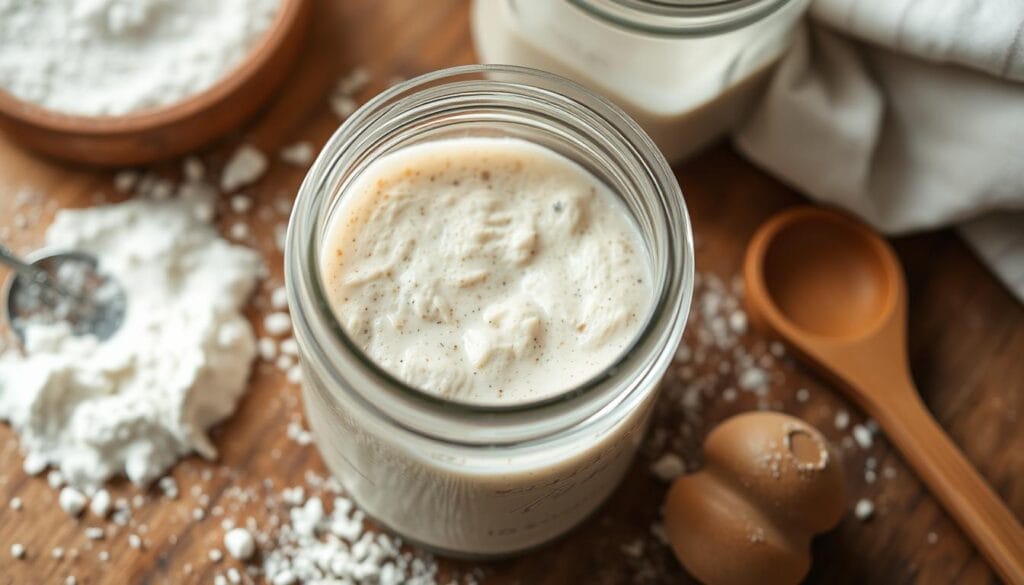The smell of sourdough bread is amazing. Its chewy crust and tangy taste make it irresistible. But is it healthier than other breads? I’ve wondered about this, looking for sourdough’s health benefits.
Let’s explore sourdough together. We’ll see how it can make us feel better inside and out.
Understanding the Ancient Art of Sourdough Bread Making
Sourdough bread has been around for thousands of years, starting in ancient Egypt. It’s different from regular bread because it uses wild lactic acid bacteria and yeast. This old tradition shows how versatile and complex sourdough bread is.
The Traditional Fermentation Process
The sourdough starter is key to sourdough bread. It’s a mix of wild yeast and bacteria that starts the fermentation. Bakers work hard to grow this starter, sometimes for weeks.
The fermentation time varies, from 4 to 24 hours. This depends on the starter and the temperature.
Role of Wild Yeast and Lactic Acid Bacteria
The mix of wild yeast and lactic acid bacteria in the starter makes sourdough special. They make the bread light and give it a tangy taste. Each starter is different, leading to unique flavors and textures.
History and Cultural Significance
Sourdough bread is loved worldwide. Places like France and Germany have their sourdough traditions. In the U.S., San Francisco sourdough is famous for its taste and texture.
Sourdough has played big roles in history, like during the Klondike Gold Rush. It was the main food for miners.

Nutritional Profile of Sourdough Sandwich Bread
Sourdough sandwich bread is very nutritious. A medium slice has 130 calories, 4g of protein, and 1g of fat. It also has 25g of carbs, 1g of fiber, and less than 1g of sugar. Plus, it’s packed with vitamins B, iron, calcium, and antioxidants.
The type of flour and how it’s made can change sourdough’s nutrition. Whole grain sourdough has more fiber, protein, and nutrients than regular. It’s a better choice for those wanting a healthier bread.
| Nutrient | Sourdough Bread (50g) | Regular Bread (50g) |
|---|---|---|
| Calories | 130 | 150 |
| Protein | 4g | 3g |
| Fat | 1g | 2g |
| Carbohydrates | 25g | 28g |
| Fiber | 1g | 0.5g |
| Sugar | Less than 1g | 1g |
| Sodium | 200-300mg | 300-400mg |
The way sourdough is made makes it special. It makes nutrients easier to use and cuts down on bad stuff like phytic acid. This makes sourdough a great choice for a healthier bread.

Is Sourdough Sandwich Bread Healthy: A Comprehensive Analysis
Sourdough sandwich bread is a healthier choice than regular white or wheat bread. The way it’s made changes its nutritional value and health benefits.
Comparing Sourdough to Regular Bread
Sourdough bread is better than regular bread for many reasons:
- Higher Nutrient Bioavailability: Making sourdough bread increases the body’s ability to use nutrients like folate and vitamin C.
- Lower Glycemic Index: Sourdough bread doesn’t raise blood sugar levels quickly. This is good for people with diabetes or those trying to lose weight.
- Easier Digestion: Sourdough is easier to digest, especially for those with gluten issues. The gluten breaks down during fermentation.
Impact on Digestive Health
Sourdough bread is good for your gut health. It has prebiotics that help beneficial bacteria grow. This supports a strong immune system.
Blood Sugar Management Benefits
The lower glycemic index of sourdough bread helps manage blood sugar. Studies show it can help keep blood sugar levels stable. This may lower the risk of type 2 diabetes.

The Science Behind Sourdough’s Health Benefits
Sourdough bread is known for its health perks, thanks to a fascinating science. The fermentation process that makes it taste and feel special also boosts its nutritional value.
One big plus of sourdough is it cuts down on phytic acid. This anti-nutrient blocks the body from absorbing minerals like iron, zinc, and calcium. The fermentation breaks it down, making these nutrients easier for us to use.
- Sourdough also makes resistant starches. These help control hunger and aid in weight management by slowing down carb digestion.
- The acids from fermentation lower the bread’s pH. This can make it last longer and resist mold better, making it a greener option than regular bread.
But there’s more. The mix of lactic acid bacteria and wild yeasts in sourdough makes it good for your digestion. It breaks down proteins, starches, and fats gently.
So, if you want to boost your gut health, support your immune system, or just enjoy tasty, healthy bread, sourdough is a great pick. Adding it to your diet can be a tasty and healthy step towards wellness.
Enhanced Nutrient Absorption and Bioavailability
Sourdough bread is great for nutrient absorption. The making process breaks down phytic acid. This helps your body get more iron, zinc, and magnesium.
Reduction of Phytic Acid
The sourdough process makes an enzyme called phytase. This enzyme breaks down phytic acid. So, your body can absorb more minerals from the bread.
Mineral Content and Absorption
Sourdough bread has more minerals and better absorption. The making process makes minerals like iron, zinc, and magnesium easier for your body to use.
Probiotic Properties
Even though baking kills the probiotics, the prebiotics stay. These help your gut bacteria, improving digestion and nutrient absorption.
Trying sourdough bread-making opens up a world of better nutrient absorption. It’s a healthy choice for your body.
Blood Sugar Control and Glycemic Index
If you worry about blood sugar, sourdough bread might be better than regular bread. It has a lower glycemic index (GI). This means it raises your blood sugar slowly and steadily.
The way sourdough bread is made is important. It has a GI of about 54.6. This is much better than many commercial breads.
The longer time sourdough bread ferments makes it more nutritious. It also tastes sour, which is good for you. This makes the bread easier to digest.
Whole grain or sprouted grain sourdough breads are even better. They have lots of fiber. Fiber helps your body absorb carbs slowly, keeping blood sugar levels steady.
Choosing sourdough bread is a smart move for blood sugar control. It has a lower glycemic index and more nutrients. It’s also full of fiber. Adding it to your diet can help manage blood sugar levels.
Digestive Benefits and Gluten Sensitivity
Sourdough bread is good for your stomach and those who can’t handle gluten well. The way it’s made makes it easier to digest. It also has special fibers that help your gut.
Prebiotic Properties
Sourdough has more fiber than regular bread. This fiber is great for your gut. It feeds the good bacteria in your stomach, helping you digest better.
Effects on Gut Health
The sourdough-making process makes nutrients easier to use. It also breaks down gluten, making it easier for some to eat. But, it’s not gluten-free, so people with celiac disease should avoid it.
But, sourdough might be okay for those who just can’t handle gluten well. Always talk to a doctor before trying it.
Choose sourdough that says “naturally leavened” or “wild yeast.” This means it’s made the old way, which is healthier. Buying it from bakeries or farmer’s markets can get you a better product.
Making the Right Choice: What to Look for in Sourdough Bread
Choosing the healthiest sourdough bread means looking at a few key things. Go for whole wheat or whole grain breads. They have more fiber, protein, and nutrients than refined flour breads.
Look for loaves made from whole wheat, spelt, or rye flours. These ancient grains add extra nutrition.
Choose sourdough with fewer ingredients and less sodium and sugar. Bread made with a homemade starter and no added yeast, oils, or sweeteners is best. Or, make your own sourdough at home to control the ingredients.
Einkorn wheat is another good choice. It’s an ancient grain that might be very nutritious. The most important thing is to find true, artisanal sourdough bread. It should be made the old-fashioned way, with a long fermentation process.
| Bread Type | FODMAP Level | Serving Size |
|---|---|---|
| White Wheat Sourdough | Low FODMAP | 2 slices (109g or 3.95oz) |
| Spelt Sourdough | Low FODMAP | 2 slices |
| Wholemeal Wheat Sourdough | Low FODMAP | 2 slices (97g or 3.42oz) |
| Oat Sourdough | Moderate FODMAP | 1 slice (26g or 0.91oz) |
| Kamut Sourdough | High FODMAP | Not recommended |
| Rye Sourdough | High FODMAP | Not recommended |
Not all sourdough breads are the same. Always check the ingredients list. Choose options that fit your health goals and diet. With the right healthy bread options, you can enjoy the taste and benefits of whole grain sourdough and artisan bread nutrition.
Conclusion
Sourdough bread is not just tasty; it’s also good for you. Its special way of making bread helps your body absorb nutrients better. It also makes digestion easier and helps keep blood sugar levels stable.
Adding sourdough to your meals can boost your gut health and fight off stress. It keeps your energy up all day. If you have diabetes, want to lower cholesterol, or just want healthier bread, sourdough is a great choice.
Opt for sourdough made with natural starters and fermented for a long time. This way, you get all the health benefits it offers. Enjoy its rich flavors and know you’re feeding your body with good stuff.
FAQ
What are the health benefits of sourdough bread?
Sourdough bread is good for your gut and blood sugar. It’s easier to digest than regular bread. It has vitamins B, iron, and calcium.
How is sourdough bread different from regular bread?
Sourdough uses wild yeast and bacteria, not commercial yeast. This makes it tangy and naturally leavened. It’s different in taste and making.
What is the nutritional profile of sourdough bread?
A medium slice of sourdough has 130 calories and 4g protein. It has 25g carbs, 1g fat, and 1g fiber. It’s rich in vitamins B, iron, and calcium.
Is sourdough bread healthier than regular bread?
Yes, sourdough is healthier. It’s easier to digest and has more nutrients. It’s good for those with gluten issues.
How does the fermentation process benefit sourdough bread?
Fermentation makes sourdough better. It boosts nutrient levels and makes it easier to digest. It also helps with hunger and weight.
How does sourdough bread affect blood sugar levels?
Sourdough bread is better for blood sugar. It raises it slowly, helping with weight control. It’s good for managing blood sugar.
Is sourdough bread easier to digest?
Yes, sourdough is easier to digest. It has more fiber and less gluten. This is good for those with gluten issues.
What should I look for when choosing sourdough bread?
Choose whole wheat or whole grain sourdough. It has more fiber and nutrients. Look for fewer ingredients and less sodium and sugar.

